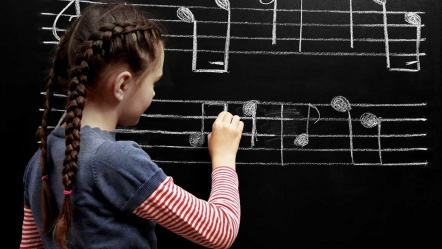New York, NY (Top40 Charts) Music can be defined as sound that has been organized by using either melody, rhythm, or harmony. The development of music involves differently pitched notes to create rhythm. As such, to ensure the production of quality music, there exist music education programs that are offered in most learning institutions worldwide. Music education incorporates an array of other learning domains. They include:
- Psychomotor domain - Controls the acquisition and development of new skills.
- Cognitive domain - Part which is tasked with gaining knowledge on various subjects.
- An effective domain - Characterized by your willingness to learn.
Also, music students learn to sensitize and appreciate different types of music.
However, recently various arts programs have continuously been omitted from school timetables. This is an attempt by school administrators and government officials to reduce the expenditure of learning institutions. As a result, music and other arts programs have found themselves on the chopping block. The idea that music is no longer as important as other core subjects for students' academic development is fast catching on. This is in part due to budget cuts. However, it can also be attributed to the idea that music is more detrimental to students' mental and emotional health.
Justifiably, music can affect your mood, whether you are listening to happy or sad music. It has the potential to shift our perception of the world around us. As such, it is safe to say, its impact on a student's life is dependent on the type of music students are exposed to. Therefore, institutions of learning should view music education as a powerful medium to help students acquire a variety of skills, which will help them reduce their dependency on essay writers.
Benefits of Incorporating Music Into The School Curriculum
Music has been a significant part of a child's development even before the onset of modern languages. This often led to better brain development, increased community interaction, passing down cultural beliefs and traditions, as well as a way to relieve stress and anxiety. Today, some institutions offer music as a course or as a subject in most programs in institutions of higher learning.
However, as more and more of these institutions removed music from their respective curriculums, students will no longer be able to enjoy its benefits. The only option that music students will be left with will be to pay for private lessons, which is often out of the reach of most students as it is too expensive. This article aims to highlight some of the benefits music education has on students worldwide. These benefits include:
Stimulates the development of reasoning and language skills
When listening to music, students can learn new skills such as deduction and reasoning, both of which are essential for learning. Besides, music provides students with the unique opportunity of learning various languages.
Improved mortar control and better hand-eye coordination
When learning to play a musical instrument, you exercise various joints to improve your motor control. You also benefit from improved hand-eye coordination, a skill that could be useful in other areas of study.
Emotional development
Music has a way of changing how we feel at a certain period. As such, the piece is essential for the emotional development of students.
Enhanced auditory skills
When you are used to listening to various genres of music, you develop far superior auditory skills that can help you become a better student.
Improved creative thinking
Both listening and creating music require time and effort, which in turn helps to boost your innovation and creativity in other aspects of learning.
Opportunities to learn about the benefits of collaboration
Students playing in a music band likely already understand how essential teamwork is. You learn to rely on others for support.
Increased engagement in school
Music education required a level of dedication and time to complete. As such, you are less likely to engage in harmful activities that would limit your ability to learn.
Music education incorporates many other areas of study
When learning music, you also get the opportunity to learn various other subjects, even if you do not realize it at the time. This helps in the student's mental development.
As an added benefit, music has the potential to instill discipline and teach students proper time management techniques. As such, music education should be offered in learning institutions worldwide. Music has immeasurable benefits for people of all ages, more so students. It is evident that the benefits of music education far outweigh its drawbacks. Thus, students should be given a chance to learn music.























